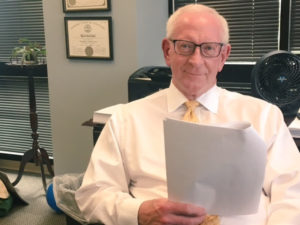 Denied SSDI Due to Lack of Medical Evidence?
Denied SSDI Due to Lack of Medical Evidence?
If your SSDI claim is denied from lack of medical evidence, you may not know what to do next.
Being denied benefits when you desperately need them can be incredibly frustrating and overwhelming. And a lack of medical evidence is one of the most common reasons people get denied.
However, this doesn’t mean your claim is hopeless or you should give up. Here’s how to move forward and get the SSDI you need.
Get an SSDI Attorney’s Help
The data doesn’t lie. The SSA denies a vast majority of claims on the first try, and people who come back with a lawyer have a much higher chance of success. You only have 60 days to appeal, so you have to move quickly.
An experienced attorney can help you gather the necessary medical evidence, file a strong appeal, and navigate the complex appeals process.
No matter what else you do to strengthen your claim, if you really want the best chance possible, you should work with a lawyer.
 Collect Your Medical Records and Any Additional Evidence
Collect Your Medical Records and Any Additional Evidence
The first thing I ask my clients who got denied is whether they’ve had a doctor confirm their disability. If they have, then it becomes a process of looking at the records and strengthening the evidence even further. If they haven’t, we get them in to see someone immediately.
You should always contact your healthcare providers and request copies of all relevant medical records. Discuss your condition with your doctors and get as much documentation as possible to strengthen your claim. Your attorney can oversee this process and make sure the medical statements set you up for a successful claim.
Get a Functional Capacity Evaluation, If Needed
A functional capacity evaluation (FCE) is a test that assesses your ability to perform work-related tasks. This evaluation can provide valuable medical evidence to support your SSDI claim.
Through this evaluation, a specialist looks at your ability to work based on your disability. The judge will often assign this person to investigate your education, career, and physical limitations, so they can better understand how your disability impacts your work.
Your SSDI attorney can help you determine if an FCE is appropriate for your case.
 File a Request for Reconsideration
File a Request for Reconsideration
If your claim is denied at the hearing stage, you have the right to file a request for reconsideration. This is a formal process that allows you to submit additional evidence in support of your claim.
Make sure you follow all instructions carefully and provide as much medical evidence as possible. Again, a good SSDI attorney can oversee this process for you and give you a better chance of success.
Choosing the Right SSDI Lawyer for You
If you’re denied an SSDI claim because of lack of medical evidence, you only have 60 days to appeal. During that time, you need to get a lawyer who is:
- experienced
- organized
- dependable
 Look for an SSDI lawyer with years of experience under their belt. Our attorneys have helped thousands of people in Memphis, and we pride ourselves on our decades-long reputation for getting the benefits our clients need.
Look for an SSDI lawyer with years of experience under their belt. Our attorneys have helped thousands of people in Memphis, and we pride ourselves on our decades-long reputation for getting the benefits our clients need.
It’s also important your lawyer stay organized and keep detailed records throughout the appeals process. They will manage all the copies of all correspondence and medical records and make sure you submit your documents on time.
And lastly, you want someone you can depend on. Your attorney should answer your questions, keep open communication, and stand by your side every step of the way. Our attorneys do that and more. We offer free reports to help you navigate the SSDI process, and we don’t get paid a penny unless you do (even then it’s just a fraction of your past-due benefits).
Don’t give up – with the right approach and the right team by your side, you can still get the benefits you deserve.
Call us today at 901-327-2100 or fill out the form on this page to get started.
